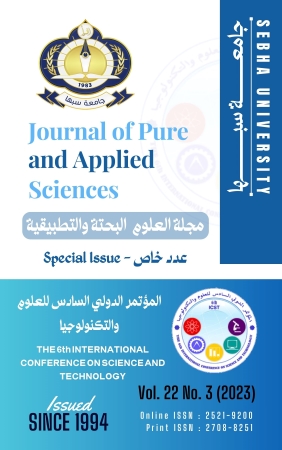Analysis of Potassium Bromate Contents of Commonly Consumed Loaves of Bread Samples in Tokra-Libya
Abstract
Bread is one of the most popular foods consumed worldwide. It is a very popular foodstuff consumed in almost every house in Libya as well as in Tokra city as breakfast. Potassium bromate is an oxidizing agent that has been used as bread additive added to preserve the flavour and teste of the bread but continuing to consume it endangers health as a result of its carcinogenic effect, as it remains in the loaf of bread without disintegration, For this reason, Potassium bromate is banned in several countries, including Brazil, Canada, the European Union and the United Kingdom and the FDA has since 1991 merely encouraged bakers to voluntarily stop using it, with somewhat limited success. In this study, levels of residual bromate were determined in 21commercial breads and traditional loaf types from 7 automated bakeries, except for one, a manual bakery randomly were collected from different local bakeries in Tokra city and its environs (Libya), in Feb. 2023. The tested samples of bread were analyzed using two mothed (qualitative and quantitative analyses) a spectrophotometric method of bromate analysis. Bromate concentrations ranged from 0.07-0.29 μgg-1, with an overall mean concentration of 0.14±0.07 μgg-1(ppm). Significant differences were noticed.
Full text article
Authors
Copyright (c) 2023 Journal of Pure & Applied Sciences

This work is licensed under a Creative Commons Attribution 4.0 International License.
In a brief statement, the rights relate to the publication and distribution of research published in the journal of the University of Sebha where authors who have published their articles in the journal of the university of Sebha should how they can use or distribute their articles. They reserve all their rights to the published works, such as (but not limited to) the following rights:
- Copyright and other property rights related to the article, such as patent rights.
- Research published in the journal of the University of Sebha and used in its future works, including lectures and books, the right to reproduce articles for their own purposes, and the right to self-archive their articles.
- The right to enter a separate article, or for a non-exclusive distribution of their article with an acknowledgment of its initial publication in the journal of Sebha University.
Privacy Statement The names and e-mail addresses entered on the Sabha University Journal site will be used for the aforementioned purposes only and for which they were used.

